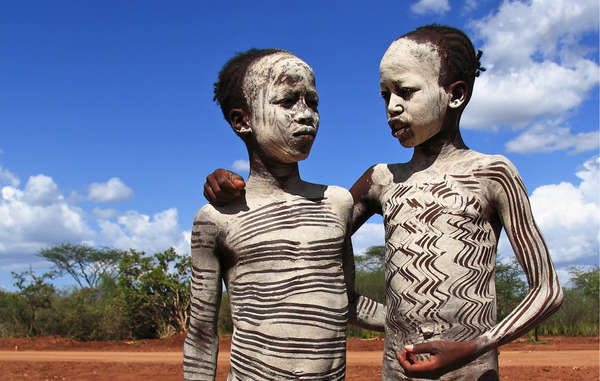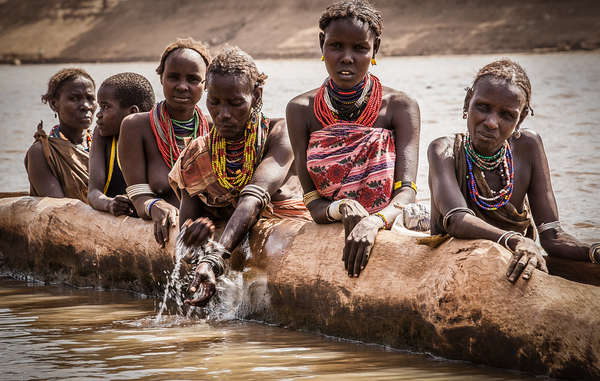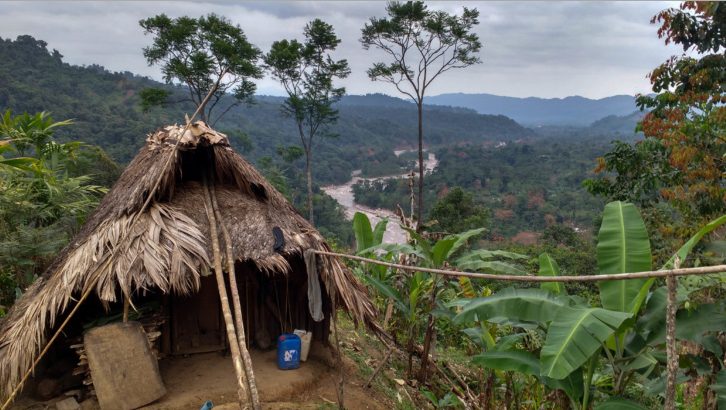
by Deep Green Resistance News Service | May 8, 2016 | Indigenous Autonomy, Obstruction & Occupation, Property & Material Destruction
This is the first installment of “The Guardians of Mother Earth,” a four-part series examining the Indigenous U’wa struggle for peace in Colombia.
On September 23, 2015, in the Palace of Conventions in Havana, Cuba, his excellency Juan Manuel Santos, the President of the Republic of Colombia, and Commander Timoleon Jimenez, Chief of General Staff of the Revolutionary Armed Forces of Colombia, signed an agreement on transitional justice and reparations to the victims of the country’s 51 year old civil war, resolving one of the final points in the country’s peace negotiations.
“We are adversaries, we come from different sides, but today we move in the same direction,” said President Santos, “this noble direction that all societies can have, is one of peace.”
In a show of unity, the warring parties all wore white-collared shirts without ties, as they sat on opposite sides of the brown mahogany tables encircling an artificially bright-green shrubbery arrangement. Around the room’s perimeter stood a throng of reporters, crowded together behind a red rope line, snapping photos of the historic handshake between the president and the leader of the country’s largest guerrilla army. A prolonged war that has killed more than 260,000 people and victimized and displaced seven million more seemed to be drawing to an end.
Among the victims of the conflict are the Indigenous Peoples of Colombia. Of the 102 tribal nations in existence today more than half are at risk of disappearing – forced displacement and mining on indigenous territory during the armed conflict have contributed heavily to the widespread demise.
A progressive genocide of negligence and privation is also taking place. The Indigenous Peoples of Colombia are routinely denied basic commodities such as antibiotics, vaccines and clean drinking water that residents of big cities take for granted, not because the country’s indigenous have been targeted for extermination, but because they have become politically insignificant.
During the Havana peace accord, the indigenous nations who trace their Colombian heritage back thousands of years, from before the time of the Spanish conquest, were not mentioned once.
Inside a wooden shack in the isolated cloud forests of eastern Colombia, three kilometers west of the Arauca river on the Venezuelan border, Berito Cobaria, the internationally recognized leader and spiritual guide of the indigenous U’wa, points out the shades on the x-ray scan of his chest. It shows the same strain of tuberculosis that is ravaging his people.

Berito X-ray. Photo: Jake Ling
The single-story hospital in Cubará, the nearest town on the river, is poorly equipped and understaffed. Visits from medical specialists are rare because the hospital is located in the “Red Zone” – conflict areas the Colombian government has declared dangerous due to the heavy concentration of guerrilla forces.
“The government needs to establish a tuberculosis clinic in Cubará,” Berito told IC. He confirmed he is slowly overcoming the deadly disease but despairs for his people as the tuberculosis outbreak rapidly spreads throughout the U’wa Nation’s ancestral lands. The U’wa believe there needs to be harmony in the world for there to be harmony in the cosmos, but the balance of nature has been disturbed and a sickness has fallen upon Berito’s people. Infectious western diseases such as influenza, dysentery, tuberculosis, and the common cold continue to wreak havoc on the unaccustomed immune systems of the U’wa, who up until the late 1940’s lived an isolated existence on the forested cliffs and the remote Andean wetlands and cloud forests of eastern Colombia.
Beginning on February 13th, 2016, Colombia’s second largest guerrilla army, the ELN (Army of National Liberation) imposed a 72-hour armed strike inside Red Zones like Cubará and other towns that border U’wa territory. Under the threat of violence, all stores and businesses in Cubará were closed, the roads were empty and lucky members of the Colombian military got three days’ rest in fortified outposts while their colleagues searched for explosives laid along Highway 66. Despite their dominance in the frontier towns along the Venezuelan border, even the ELN needs to gain permission from indigenous authorities like Berito to enter the ancestral lands of the U’wa. Known as the United U’wa Resguardo, the territory is restricted to all outsiders.
A day after the ELN’s armed strike was lifted, U’wa families on their way to Cubará to stock up on supplies of bread, sugar, eggs and tobacco were traveling barefoot or on the backs of pickup trucks past Berito’s home, which stands sentinel on the eastern border of the resguardo. Ten minutes away at the border town, Colombian soldiers had returned from their outposts to patrol the streets. Stores were serving clients, and locals walked openly with white plastic shopping bags, acts that had been banned and punishable by death during the armed strike. The only trace of the armed strike was the ubiquitous graffiti scrawled on buildings around town: “ELN – 51 YEARS OF RESISTANCE”.
Historically, U’wa territory has been of strategic importance to the Marxist guerrillas because it connects the contraband routes from Venezuela over the Arauca river to the central Andes of Boyacá province, a short drive from the capital Bogotá. Unarmed outside of the agricultural tools they use to cultivate staple crops of yucca, plantains and potatoes, the U’wa authorities will reluctantly grant permission to the ELN to pass through the resguardo on the strict condition they do not set up camp inside their territory. In return the ELN respect U’wa sovereignty, will not enter without permission and will not stop until they have traversed the steep and extremely difficult climb out of the cloud forests and cross the western border of the resguardo, below the snow-capped mountains of the Sierra Cocuy and Güicán.
This region, which is rich in lucrative oil and gas reserves, is also of great strategic importance to the United States’ and Colombian governments, multinationals like Houston-based Occidental Petroleum and Spanish oil giant RepSol, as well as the right-wing paramilitary death squads, which have been historically allied with the central government and big business. For the U’wa Peoples, however, oil is the sacred blood of their Mother Earth, and without its blood their mother will die. For more than two decades U’wa have mobilized aggressive non-violent campaigns to assert more control over their ancestral territory in the midst of one of the most troubled regions of the Colombian Civil War, but it was their struggle against Occidental Petroleum (called Oxy for short) that gained international attention in 1997, when Berito declared that his people “would rather die, protecting everything that we hold sacred, than lose everything that makes us U’wa.”

Oil blocks on U’wa territory. Map by Fidel Mingorance / HREV 2014
As Oxy pushed into the U’wa’s ancestral lands, the indigenous nation collectively threatened to commit mass suicide by leaping off a 15,000-foot cliff if drilling on their territory went ahead. This was not a publicity stunt. U’wa tribal lore tells of their people walking off the “Cliffs of Glory” en masse centuries ago rather than submit to the brutal Spanish conquistadors. The U’wa set up a makeshift village beside Occidental Petroleum’s Gibraltar 1 drilling site, and were clubbed, tear-gassed, threatened with rape, evicted, arrested, and harassed by state security forces on behalf of Oxy. A year later in 1998, Berito was given the prestigious Goldman Environmental Prize for leading the non-violent campaign against Occidental Petroleum – the same year the US multinational was complicit in the cluster-bombing of a countryside agricultural community, killing 18 civilians including 9 children, near the resguardo’s south-eastern border, in order to protect the Caño-Limon-Covenas oil pipeline.
The pipeline, jointly run by state-owned Ecopetrol and US-based Occidental Petroleum, pumps up to 220,000 barrels of crude daily from the war-torn Arauca province through U’wa territory on its way to the Caribbean coast. It was also the beneficiary of $100 million US military aid that was granted to the Colombian army in 2003, after Occidental Petroleum spent $4 million lobbying the US government to protect it. The ELN, and their ideological ally, the FARC, have bombed the pipeline more than a thousand times. The consecutive attacks over decades have spilt millions of barrels of cancerous unprocessed crude into the rivers and forests of the region, exponentially more than that of the Exxon Valdez environmental disaster.
In a separate bombing incident in March 2014, the U’wa refused to permit repairs to the pipeline until the government began dismantling the Magallanes drilling site on the northern border of the U’wa resguardo, which Ecopetrol had set up in secret months earlier. The Wall Street Journal reported the Colombian government lost $130 million during the 40-day U’wa protest, which was resolved by dismantling the new drilling rig. Ecopetrol has not cancelled the mining license, however, and the threat of exploitation remains. The most recent attack on the pipeline was a twin bomb attack by the ELN on March 15th, 2016, a week before the deadline to finalize the preliminary peace agreement that President Santos and Commander Timoleon Jimenez had agreed to six months earlier in Havana.
As the March 23rd deadline came and went without even a symbolic gesture of unity, both the FARC and government blamed each other for stalling. A week later the government saved face by announcing to the press it had entered formal peace talks with the ELN, but the country’s second-largest guerrilla army watered down public optimism by stating negotiations would not stop them from attacking critical government infrastructure, which include mining assets in the region and oil concessions surrounding U’wa territory such as Oil Block Cor 19 and Cor 45 which extend across the west and north-west of the resguardo; the Arauca oil block; and RepSol and Integra Oil drilling rigs on the resguardo’s eastern border. There is also Ecopetrol’s Siriri Oil Block, which along with Caño-Limon-Covenas is located in the north of U’wa territory.
A small fraction of a percent of the money rolling in from this multi-billion dollar mining bonanza would be more than enough to fund schools, provide fully-stocked healthcare facilities and install piping to provide clean drinking water for every indigenous and rural community in the region. In one isolated U’wa school inside the resguardo, four computers generously donated by the Colombian government gather dust because there is no electricity; here many of U’wa children are malnourished with swollen bellies because a non-native parasitic worm has contaminated the water supply. In a tin-roofed shack that serves as a hospital in Chuscal on the other side of the resguardo, the head nurse complains of the difficulty of caring for patients suffering from tuberculosis and dysentery because of a lack of vaccines, antibiotics and even clean drinking water after an oil spill contaminated the river.
Now while the international community is openly discussing buzzwords like “Peace Colombia” and “post-conflict” in anticipation of a historic peace agreement between the FARC and government, the U’wa people are demanding high-level talks with the government to address their various grievances. The government response has thus far been to ignore the U’wa, or to invite an indigenous delegation to Bogotá where low-level bureaucrats with no authority merely shuffle papers and nod their heads. Meanwhile, the tuberculosis outbreak continues to spread across U’wa territory.
The U’wa, who call themselves the people who know how to think and speak, consider themselves the Guardians of Mother Nature, and large tracts of land inside their territory have become biological reserves for jaguars, spectacled bears, as well as a kaleidoscopic array of endemic plant and bird life that do not appear anywhere else on the planet. As an ambassador for his tribe, Berito has traveled the world recruiting the support of activists of all stripes, from the late Terry Freitas, native American activists Ingrid Washinawatok and Lahe’enda’e Gay, to the founder of Amazon Watch Atossa Soltani, and Hollywood celebrities like Avatar director James Cameron.
The indigenous leader knows that the ability of his pacifist tribe of 7,000 people to defend themselves against these extremely powerful economic and political forces is limited. This is especially true while numerous multinationals and armed groups battle for control around and sometimes inside his people’s land hidden from the eyes of the international community beneath the forest canopies. Non-violence, however, needs an audience and once again the U’wa leader is calling upon the world to watch over his people.
“History is its own kind of law,” Berito said. “They say the land is dead, but it lives yet. It is only wounded by the taking of oil. The dignity of native peoples comes from the land – and like the land it can be saved.”
The second installment in this series examines the U’wa struggles against tuberculosis, parasitic worms, climate change and threats of violent paramilitary repression. You can read it here: They say the land is dead, but it lives yet
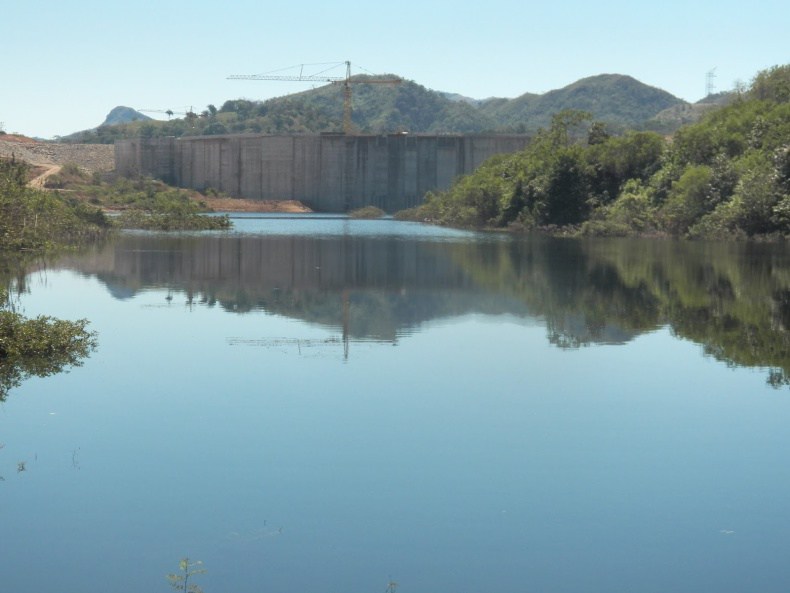
by Deep Green Resistance News Service | Apr 13, 2016 | Biodiversity & Habitat Destruction, Indigenous Autonomy
Featured image: The Barro Blanco Dam will have a disastrous effect on Ngäbe communities inside the Comarca Ngäbe-Bugle and campesino communities also living on the banks of the river. Photo Oscar Sogandares
By Jennifer Kennedy/ Intercontinental Cry
Ngäbe communities in western Panama are calling for support from the international community after officials from the Honduran-owned energy company, GENISA, warn that they will soon be evicted from their homes to make way for the flooding of the Barro Blanco hydro dam reservoir.
Ricardo Miranda, a spokesperson from the Movimiento 10 De Abril (M10) resistance movement, told IC, “The situation for the Ngäbe people is critical and tense with the imminent closure of the Barro Blanco gates. The government has announced that the gates will be closed in April and before that people will be evicted.”
The 28.84 megawatt dam is being constructed by GENISA on the Tabasará River in the western province of Chiriquí. Although located in Chiriquí, the dam will have a disastrous impact on Ngäbe communities inside the Comarca Ngäbe-Bugle and campesino communities also living on the banks of the river.
Once the gates are closed and the reservoir is filled, the subsistence fishing practices of all nearby communities will take a severe hit; cultivable land will be irrecoverably lost and the Ngäbe themselves will lose their school, their cultural centre and two sets of ancient petroglyphs that are of considerable cultural and archaeological importance.
Before this happens, Ngäbe-Bugle and campesino communities in the impact area will be forced from their homes.

A celebratory gathering to honor the petroglyphs. Photo: Oscar Sogandares
GENISA officials have reportedly claimed that the dam’s reservoir will be filled on April 15.
M10 has been fighting relentlessly to halt the project since the movement was founded in 1999, when a group of Ngäbe protesters were arrested for opposing the dam. Working along side them is Movimiento De Septiembre 22 (M22), an independent Ngäbe movement whose members follow Mama Tata, a religion that’s centered on cultural revival. M22 made international headlines in 2015 when they blocked the entrance to the dam for 38 consecutive days, until riot police, claiming to act in self-defense, unleashed pepper spray and batons on the Ngäbe activists, women and children among them.

Edilma Pinto, 17, suffered a fractured foot during the 2015 police crackdown. (Photo: Oscar Sogandares
Silvia Carrera, chief of the Comarca Ngäbe-Bugle, who is currently in negotiations with the government, was initially supportive of M10 and M22’s resounding calls to cancel the project. However, Carrera changed her position after the July crackdown, signing a document with the government in favour of the project.
Under that document, the dam is forbidden to proceed until an agreement is reached with the region’s indigenous and campesino stakeholders. Unfortunately, this provision appears to have slipped off the table. Flood tests are now taking place and according to the international NGO Carbon Market Watch (CMW), there remains a worrying lack of requisite dialogue between the government and the communities affected by the hydro dam.
GENISA itself has never sought the free, informed, and prior consent (FPIC) of the indigenous communities living on the banks of the Tabasará river.
Miranda says affected communities are as adamant as ever that the project be stopped. Together, they are urgently calling on the international community for support.
“We are asking for international solidarity in the struggle for water and the Tabasará River. We are asking people to demand the definitive cancellation of Barro Blanco and to demand an end to the violence against the Ngäbe which is being inflicted by the project,” he said.
GENISA isn’t the only one that’s failing to live up to stakeholder expectations.
The US$78M project, registered under the United Nation’s CDM carbon offsetting mechanism, has received significant financing from The Netherlands Development Finance Company (FMO), The German Investment & Development Company (DEG) and the Central American Bank for Economic Integration (CBIE).
The FMO and DEG previously admitted to failing their own due diligence tests during the course of financing. A report published in May 2015 by FMO’s internal Independent Complaints Mechanism (ICM) states, “Lenders should have sought greater clarity on whether there was consent to the project from the appropriate indigenous authorities prior to project approval.”
In June 2015, however, the lenders took things one step further by threatening the Panamanian government when it temporarily suspended Barro Blanco’s construction.
Denouncing the developments banks, Miranda told IC that “the FMO and DEG are complicit in the serious violations of human rights on the Tabasará River.”
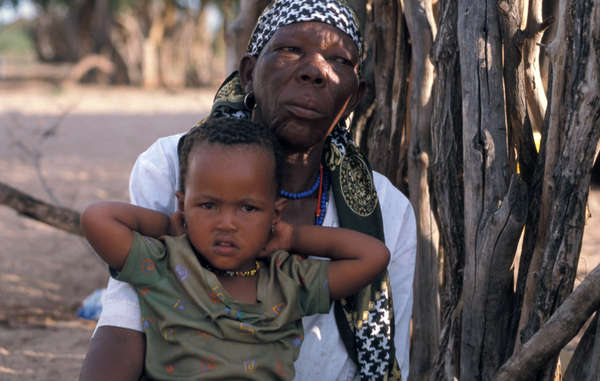
by Deep Green Resistance News Service | Mar 11, 2016 | Colonialism & Conquest
Featured image: Botswana government resettlement camps are poorly supplied, and diseases like HIV/AIDS are rife. © Fiona Watson/Survival International
By Survival International
Survival International has launched a campaign calling for an end to a draconian system in Botswana which has broken Bushmen families apart and denied them access to their land. Critics such as veteran anti-apartheid activist Michael Dingake have compared the system to the apartheid-era pass laws.
The call comes in the fiftieth anniversary year of Botswana’s independence.
After having been brutally evicted and forced into government camps between 1997 and 2002, the Bushmen won a historic court victory in 2006 recognizing their right to live on their land in the Central Kalahari Game Reserve.
Since then, however, this right has only been extended to the small number of Bushmen named in court papers. Their children and close relatives are forced to apply for permits just to visit them, or risk seven years in prison, and children born and brought up in the reserve have to apply for a permit when they turn 18. Many fear that once the current generation has passed away, the Bushmen will be shut out of their land forever.
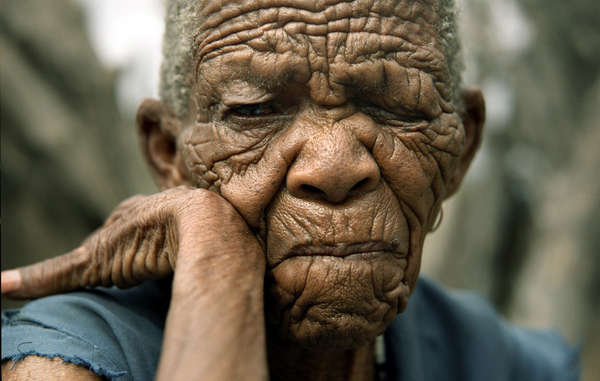
Most Bushmen are still forced to live in government resettlement camps, rather than on their land in the Central Kalahari Game Reserve
© Dominick Tyler
On the subject of the fiftieth anniversary, one Bushman told Survival: “I don’t even know anything about these celebrations. They are doing this so that people will not think they are a bad government. They are celebrating; we are not. We’re still feeling the same way. They’ve been celebrating for the last 49 years.”
Survival’s Director Stephen Corry said: “The Botswana government has viciously persecuted the Bushmen for decades, first with violent evictions and then with a permit system designed to break families apart. If Botswana still wants to be seen as a “shining light” of democracy in Africa, it needs to listen to the Bushmen, uphold its own court’s ruling and end this appallingly unjust restriction on the Bushmen’s right to live on their ancestral land in the Central Kalahari reserve. I hope that this historic year will mark the end of the decades long persecution of the Bushmen.”
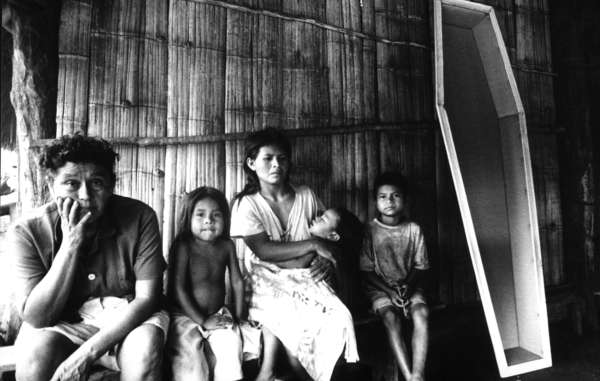
by Deep Green Resistance News Service | Feb 9, 2016 | Alienation & Mental Health, Colonialism & Conquest
Featured image: A bereaved Guarani family waiting beside a coffin. The wave of suicides that has struck the Guarani Indians in the last 20 years is unequalled in South America. Suicide is often seen as the only option by people forced from their land and into a way of life they did not choose. Photo © João Ripper/Survival
By Survival International
A new report published by Survival International reveals that the appalling suicide rate among the indigenous Guarani Kaiowá people of southern Brazil is the highest in the world.
The rate of self-inflicted deaths within the tribe is 34 times the Brazilian national average, and statistically the highest among any society anywhere on earth. Suicide rates among many other indigenous peoples such as Aboriginal Australians and Native Americans in Alaska also remain exceptionally high. This can be viewed as the inevitable result of the historical and continuing theft of their land and of “development” being forced upon them.
The report, “Progress can Kill,” exposes the devastating consequences of loss of land and autonomy on tribal peoples. As well as the shockingly high suicide rates among tribes, it also reveals high rates of alcoholism, obesity, depression and other health problems.
Particularly striking statistics include the sky-rocketing rates of HIV infection in West Papua, which increased from almost no cases in 2000 to over 10,000 by 2015, and the rate of infant mortality among Aboriginal Australians – twice that in wider Australian society. In large parts of the world, poor nutrition continues to cause further problems, such as malnutrition for Guarani children in Brazil, who are forced to live on roadsides, and obesity for many Native Americans, for whom junk food is the only viable option.
Roy Sesana of the Botswana Bushmen, forcibly evicted from their land in 2002, said: “What kind of development is this when the people lead shorter lives than before? They catch HIV/AIDS. Our children are beaten in school and won’t go. Some become prostitutes. We are not allowed to hunt. They fight because they are bored and get drunk. They are starting to commit suicide. We never saw this before. Is this ‘development?’”

Many Aché starved to death after being forced from their forest home in Paraguay
© Don McCullin/Survival
Olimpio, of the Guajajara tribe in the Brazilian Amazon, said: “We are against the type of development the government is proposing. I think some non-Indians’ idea of ‘progress’ is crazy! They come with these aggressive ideas of progress and impose them on us, human beings, especially on indigenous peoples who are the most oppressed of all. For us, this is not progress at all.”
All of these statistics demonstrate the fatal consequences of forcing change on tribal societies in the name of “progress” and “development.” In many cases, tribes have been forced to move away from abundant and sustainable food sources and a sure source of identity in favour of poverty and marginalization on the fringes of mainstream society. Tragic repercussions of such forced change can continue even several generations down the line.
Around the world, tribes continue to fight for the recognition of their right to live on their lands in peace. Where this right has been respected or restored, tribes flourish. For example after the creation of an indigenous reserve in the northern Amazon in 1992, medical teams worked with tribal shamans and together they halved the mortality rate among the Yanomami Indians. Likewise, the Jarawa In India live on their ancestral lands and enjoy what has been called a “life of opulence.” Nutrionists rate their diet as “optimum.”
For more information you can download Survival’s new short report, “Progress can kill,” and a more in-depth paper for those wanting to know more.
Around the world development is robbing tribal people of their land, self-sufficiency and pride and leaving them with nothing. Watch this short, satirical film, written by Oren Ginzburg and narrated by actor and comedian David Mitchell, which tells the story of how tribal peoples are being destroyed in the name of “development.”
Survival International, the global movement for tribal peoples’ rights, is calling for the United Nations to enforce better protection of tribal land rights and to call on governments to uphold their commitments to their indigenous peoples.
